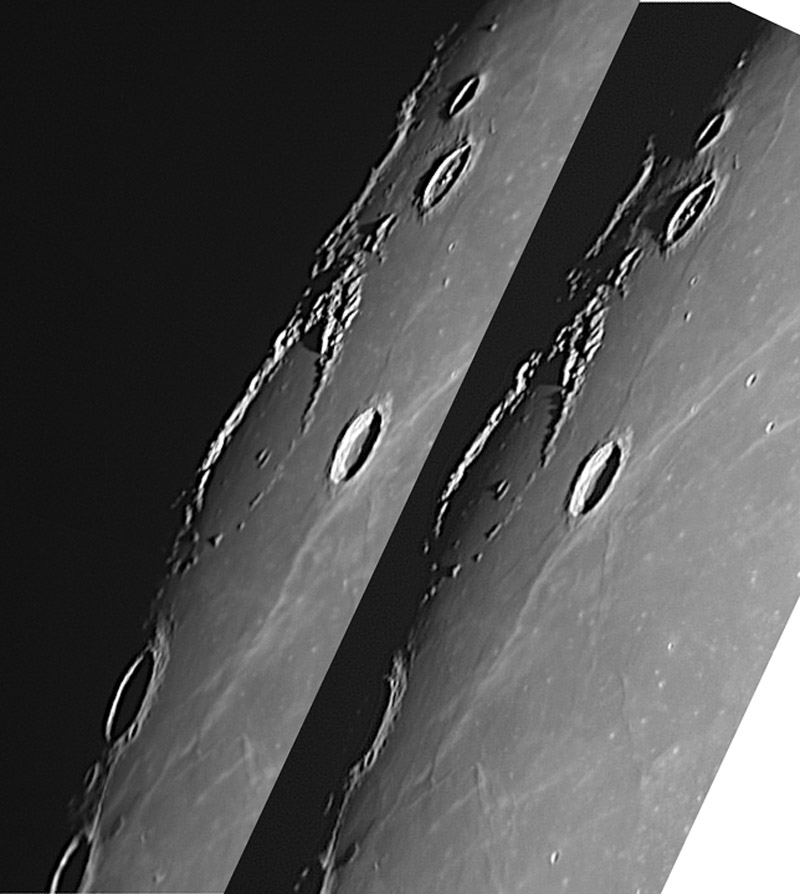Difference between revisions of "May 15, 2018"
(Created page with "__NOTOC__ =Western Tales= Originally published January 13, 2009 <!-- Start of content --> <!-- ws:start:WikiTextHeadingRule:1:<h1> --> <!-- ws:start:WikiTextLocalIm...") |
|||
| (One intermediate revision by the same user not shown) | |||
| Line 7: | Line 7: | ||
<em>image by [mailto:jocelyn.serot@wanadoo.fr Jocelyn Sérot], Clermont-Ferrand, France</em><br /> | <em>image by [mailto:jocelyn.serot@wanadoo.fr Jocelyn Sérot], Clermont-Ferrand, France</em><br /> | ||
<br /> | <br /> | ||
| − | The Moon's northwest limb is infrequently imaged, making it all the more interesting when a good shot comes in. Here we see not one, but two views of the western edge of Oceanus Procellaurm, with a difference of almost three hours between them. The large crater near the terminator is Eddington, and the bright one in the mare in front of it is Seleucus. In the earlier view (right), a long unnamed mare ridge can be seen along the entire length of of the image, passing near Briggs at the top, being squashed by the Seleucus impact, and weakening as it aims toward Cardanus (bottom left). From Seleucus south a ray of disputed origin covers the ridge. Roughness on the floor of Eddington would never be interpreted as the small [ | + | The Moon's northwest limb is infrequently imaged, making it all the more interesting when a good shot comes in. Here we see not one, but two views of the western edge of Oceanus Procellaurm, with a difference of almost three hours between them. The large crater near the terminator is Eddington, and the bright one in the mare in front of it is Seleucus. In the earlier view (right), a long unnamed mare ridge can be seen along the entire length of of the image, passing near Briggs at the top, being squashed by the Seleucus impact, and weakening as it aims toward Cardanus (bottom left). From Seleucus south a ray of disputed origin covers the ridge. Roughness on the floor of Eddington would never be interpreted as the small [https://the-moon.us/wiki/Eddington rille] that actually exists there. With the higher Sun (left), the floor and central peak of Seleucus see the light of day for the first time in 14 cold days, and the northeasterm rim peaks of Eddington seem less dramatic. <br /> |
<br /> | <br /> | ||
<em>[mailto:tychocrater@yahoo.com Chuck Wood]</em><br /> | <em>[mailto:tychocrater@yahoo.com Chuck Wood]</em><br /> | ||
| Line 15: | Line 15: | ||
<br /> | <br /> | ||
<strong>Related Links</strong><br /> | <strong>Related Links</strong><br /> | ||
| − | Rükl plate [ | + | Rükl plate [https://the-moon.us/wiki/Rükl_17 17]<br /> |
Jocelyn's [http://pagesperso-orange.fr/legalet/AstroLG/Lune.html website]<br /> | Jocelyn's [http://pagesperso-orange.fr/legalet/AstroLG/Lune.html website]<br /> | ||
<br /> | <br /> | ||
Latest revision as of 19:53, 18 August 2018
Western Tales
Originally published January 13, 2009

image by Jocelyn Sérot, Clermont-Ferrand, France
The Moon's northwest limb is infrequently imaged, making it all the more interesting when a good shot comes in. Here we see not one, but two views of the western edge of Oceanus Procellaurm, with a difference of almost three hours between them. The large crater near the terminator is Eddington, and the bright one in the mare in front of it is Seleucus. In the earlier view (right), a long unnamed mare ridge can be seen along the entire length of of the image, passing near Briggs at the top, being squashed by the Seleucus impact, and weakening as it aims toward Cardanus (bottom left). From Seleucus south a ray of disputed origin covers the ridge. Roughness on the floor of Eddington would never be interpreted as the small rille that actually exists there. With the higher Sun (left), the floor and central peak of Seleucus see the light of day for the first time in 14 cold days, and the northeasterm rim peaks of Eddington seem less dramatic.
Chuck Wood
Technical Details
Right: Jan 9th 2009 at 20h13 UT; Left: 23h UT. Mewlon 210, prime focus + DMK 31AF03 camera + IR-block filter; 15 FPS, 1/23 exp, 180 images stacked out of 1000; wavelet processing on Registax.
Related Links
Rükl plate 17
Jocelyn's website
Yesterday's LPOD: Zupiddy Do Da
Tomorrow's LPOD: A Little Bit of Mystery
COMMENTS?
Register, Log in, and join in the comments.



